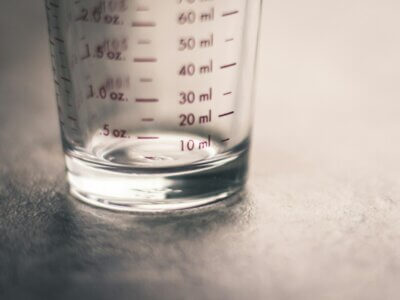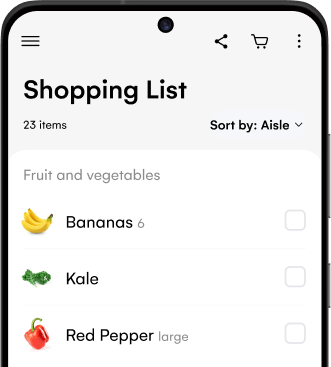Estimated reading time: 11 minutes
Vitamins and minerals are micronutrients your body absolutely needs to be healthy. Without vitamins and minerals, your body wouldn’t be able to function and you’d suffer from a large range of deficiency diseases. No food contains all vitamins and minerals in rich quantities, so the best way to get them all is to choose a varied diet that is rich in fresh vegetables, fruit, whole grain and other types of unprocessed food.
Analyse nutritional information for any recipe

However, some people may need additional help in the form of injections, infusions, or vitamin supplements. Additionally, you may also need to adjust your intake depending on your age and gender. People who are pregnant or lactating may also need more to cope with the needs of their babies.
Here’s more about these amazing micronutrients, along with what vitamin deficiencies you should be aware of and the best food sources for vitamins.
Types and Food Sources of Vitamins
There are a huge amount of vitamins available in different foods, and all of them play varying roles in supporting your overall health. Some help maintain healthy skin and bones, others are important for nerve function, some protect against internal bleeding, and plenty more. That’s why it’s important to eat a variety of foods.
You can classify vitamins as fat-soluble or water-soluble. You need both types of vitamins in your diet to maintain health and avoid any deficiencies.
The Different Fat-Soluble Vitamins and Their Food Sources
Fat-soluble vitamins (A, D, E, and K) dissolve in fat and are stored in your body. While this means your body has ‘easy access’ to them, it also means they aren’t removed easily. As a result you can build up a dangerous amount of fat-soluble vitamins if you consume them in excess.
1. Vitamin A (chemical name: Retinol)
Vitamin A maintains your vision and eye health, it also helps form and maintain healthy teeth, bones, soft tissues, mucus membranes and skin. If you have a deficiency, you could develop night blindness and skin problems
Sources: Egg yolk, liver, fish, leafy veggies, fruits, milk, butter, cheese.
2. Vitamin D (chemical name: Ergocalciferol)
Getting some sunlight is good for you, though you do have to be wary about over exposure and sunburn.
Known as the ‘sunshine vitamin,’ vitamin D can be made by your skin when it’s exposed to sunlight. It is necessary for the proper development of bones and teeth. And it also helps maintain the calcium and phosphorus in your body. Without enough vitamin D in the diet, you could develop rickets.
Sources: Fish, fortified cereals, fortified milk and dairy, and fish liver oil (cod liver oil).

3. Vitamin E (chemical name: Tocopherol)
This vitamin prevents inflammation, oxidative stress and damage to cells. It is quite rare to have a vitamin E deficiency because it naturally occurs in a wide variety of foods. However, if you do develop a deficiency, you may suffer from hemolytic anemia.
Sources: Almonds, eggs, leafy vegetables, avocado, margarine, seeds and nuts.
4. Vitamin K (chemical name: Phylloquinone)
Vitamin K is necessary for blood clotting, which is why patients on certain blood thinners like warfarin are told to avoid it. Bleeding diathesis may occur in the absence of Vitamin K. Some studies also show that it is essential for bone health.
Sources: Cabbage, cauliflower, cereals, blueberries, kiwi, dark green leafy vegetables, fish, liver, beef, and eggs.
Water-Soluble Vitamins and Food Sources
Water-soluble vitamins (C and B) dissolve in water and can’t be stored in your body because they’re easily absorbed. This means you can’t naturally store them in large amounts to keep the vitamin balance high, so you have to take them on a continual basis.
1. Vitamin B1 (chemical name: Thiamine)
Vitamin B1 is essential for the proper functioning of nerve cells, the heart, and the brain. It also helps cells convert carbohydrates to energy.
A deficiency in vitamin B1 can initially be hard to diagnose due to vague such as fatigue and irritability. A severe deficiency is known as beriberi and can affect the nerves, muscles, heart, and brain. It’s most common in people who eat a diet mostly consisting of refined carbohydrates, and in cases of alcohol abuse.
Sources: Egg, yeast, peas, whole grains, nuts & seeds, and milk.
2. Vitamin B2 (chemical name: Riboflavin)
Riboflavin is essential for growth and manufacture of red blood cells. It also helps in food metabolism. Deficiencies in this type of B vitamin are fairly rare but symptoms can include include skin disorders, hair loss, reproductive problems, sore throat, and itchy eyes. However, people with riboflavin deficiency typically have deficiencies of other nutrients too.
Sources: Milk, egg, fish, asparagus, banana, okra, cheese, yogurt.
3. Vitamin B3 (chemical name: Niacin)
This vitamin helps you build good cholesterol. One study showed that niacin increased the level of HDL cholesterol. Niacin is also important for the maintenance of healthy nerves and skin. A niacin deficiency is rare in most industrialized countries because it is easily absorbed from most foods. However, a deficiency can cause pellagra, which causes a skin rash and digestive problems.
Sources: Turkey, eggs, avocados, beef, broccoli, and green peas.
Plan ahead and say goodbye to meal time madness

4. Vitamin B5 (chemical name: Pantothenic acid)
Vitamin B5 helps in manufacturing energy and hormones. It is also essential for the metabolism of food. Like some of the other B vitamins, deficiencies aren’t too common as it’s found in a lot of food. However, a lack of it may lead to insomnia, fatigue, and depression
Sources: Yogurt, broccoli, eggs, grains, meat, and legumes.

5. Vitamin B6 (chemical name: Pyridoxine)
Vitamin B6 helps in the formation of red blood cells and maintains brain function. It is also necessary for protein metabolism. If you don’t have enough sources of vitamin B6 in your diet you could suffer from skin rashes, anemia, and reduced immune function.
Sources: Bananas, nuts, meat, poultry, and whole grains.
6. Vitamin B7 (chemical name: Biotin)
It is necessary for the metabolism of carbohydrates, fats and protein. It also contributes to hair health and skin, which is why you often see hair growth supplements which contain vitamin B7 or biotin. If you don’t eat enough vitamin B7 rich foods you may develop alopecia (hair loss) or skin problems.
Sources: Eggs, spinach, cheese, liver, cereal and chocolate.
7. Vitamin B9 (chemical name: Folic acid)
Folic acid or vitamin B9 is particularly important for pregnancy because folate deficiency can negatively affect your baby’s nervous system. It is also required to manufacture DNA and RNA which are the building block of all genetic material. Without enough folic acid, you risk neural tube defects in unborn babies and hair and skin disorders in adults. You’ll see it in most pre-natal supplements for this reason.
Sources: Lentils, oranges, peanut butter, and fortified cereals.
8. Vitamin B12 (chemical name: Cyanocobalamin)
Vitamin B12 helps maintain a healthy nervous system, regulates metabolism and is useful in the formation of red blood cells. Even though there are lots of sources of B12 in the diet, deficiency is quite common common. Without sufficient vitamin B12 you could become anemic and have symptoms such as fatigue, dizziness, heart palpitations, digestive issues, and nerve problems like numbness and tingling.
Sources: Meat, eggs, soy milk, milk, poultry, and shellfish.
9. Vitamin C (chemical name: Ascorbic acid)
This is important for overall health and necessary for the production of collagen and the growth and repair of tissues. It’s an antioxidant that also helps in healing wounds and strengthens the immune system. Though it’s very uncommon, a lack of vitamin C can cause scurvy, which can lead to bleeding gums, loosened teeth and bleeding under your skin
Sources: Citrus fruits, bell peppers, brussels sprouts, kiwis, and strawberries.
So that’s some of the major vitamins you need to worry about eating in your diet. Food isn’t just good for vitamins, but minerals too. So what are the minerals you need to be aware of and what do they do?

The Different Minerals You Need in your Diet
Minerals help your body grow and stay healthy. The body uses minerals for many different functions, including keeping your bones, muscles, heart, and brain healthy and sending nerve impulses. Minerals are also important for making enzymes and hormones. Just like vitamins, there are food sources which contain different minerals. Eating a varied diet can help you get enough of them to sustain your body.
There are two types of essential minerals: macro and trace. Here’s the difference between them and why you need them in your diet.
Macrominerals Your Body Needs
Macrominerals, also known as major minerals, are essential minerals which are required in large quantities. There are seven main ones which you should know about.
- Calcium
Calcium is an indispensable element for blood clotting and building strong bones and teeth. It also enables muscle contraction and nerve function.
Sources: Carrots, milk, almonds, broccoli, papaya, garlic, and cashew. - Chloride
Chloride is useful for the maintenance of blood volume, blood pressure and pH of body fluids. It is a component of stomach acid (HCl) that helps maintain fluid body balance.
Sources: Table salt, seaweed, rye, and celery. - Sodium
Sodium helps in muscle contraction (during action potential) and nerve transmission. It is also necessary for food balance.
Sources: Salt, cheese, milk, soy sauce, and unprocessed meat. - Potassium
Potassium helps blood pressure rhythm and water content in cells. It also aids digestion and acts as a cofactor for enzymes. Finally, it helps in controlling nerve impulses and muscle contraction.
Sources: Fresh fruits, milk, meat, whole grains, mushrooms, pecans, and raisins. - Phosphorus
Phosphorus is useful in cell membranes and forms part of the energy molecules (ATP and ADP). DNA and RNA also contain phosphate (nucleotide formation). Along with calcium, it can help with the formation of strong bones and teeth.
Sources: Mushroom, meat, fish, beans, pecans, almonds and carrots. - Magnesium
Magnesium is involved with metabolism. It’s also essential for the regulation of muscle and nerve function, energy production, and structural components of cell membranes and chromosomes.
Sources: Dark chocolate, brown rice, spinach, soybeans, mackerel, peanuts, and cashew. - Sulphur
Sulphur helps to form cysteine and methionine. These amino acids are part of most proteins in the body. They protect your cells from damage and promote the loosening and shedding of dead skin.
Sources: Cheese, eggs, nuts, onions, fish, cucumbers, cauliflower, legumes, and milk.

Trace Minerals You Need in Your Diet
These minerals are essential too, but instead of being needed in large amounts, the body instead requires them in very small quantities. There are six you should know about and try to incorporate into your diet.
- Copper
Copper is useful for making red blood cells and regulating the nervous system. It serves as a cofactor for certain enzymes involved in energy production, connective tissue formation and iron metabolism.
Sources: Nuts, seeds, shellfish, whole grains, yeast extracts. - Iron
Iron is an essential mineral for making hemoglobin which transports oxygen in red blood cells. It is also an important component of metabolic enzymes and proteins.
Sources: Tofu, dark chocolate, cashew, egg, chickpea, and lentils. - Manganese
Manganese promotes many processes including bone development, wound healing, assisting enzymes in metabolism, antioxidant activity in the mitochondria, maintaining water balance and controlling nerve impulse transmission.
Source: Nuts, whole grains, cereals, and vegetables. - Iodine
Iodine is a component of the thyroid hormones, which regulate metabolism. It also helps in the proper functioning of the brain and promotes normal growth and development of cells.
Sources: Iodized salt, seaweed, shrimps, prunes, tuna, and oysters. - Fluoride
Fluoride stabilizes minerals in bones, hardens tooth enamel, and prevents tooth decay.
Sources: Fluoridated water, coffee, tea, oatmeal, and raisins. It’s also found in toothpaste to protect teeth. - Zinc
Zinc supports several body processes including fetal development, wound healing, production of sperm, immune system normal growth and sexual maturation.
Sources: Meat, fish, veggies, whole grains, oysters, mushrooms, beans, and pistachio.
The Bottom Line – Vitamins and Minerals are Essential for Your Health
Vitamins and minerals are involved in every aspect of health, and though we often think about our diet in terms of the right balance of macronutrients (proteins, fat, and carbohydrates), getting the right micronutrients is equally important. Without them, you won’t be able to function at your best and may even fall seriously sick.
Choosing meals with a rich variety of fresh food can help you get the recommended daily amount of all your vitamins and minerals. If you suspect you’re deficient in a vitamin or mineral despite a varied and balanced diet, it’s best to speak to your doctor instead of supplementing by yourself.
Use Samsung Food to find detailed nutrition information for any recipe as well as ingredients – that way, you can tell if you’re getting enough vitamins and minerals from your food.



